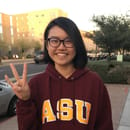I attended an educational panel titled, Disabilities and Empowerment, on Tuesday, February 6 on the Arizona State University, Tempe Campus. A group of six people shared their personal experiences surrounding topics ranging from having a disability, working with people who have disabilities, to raising a child who is disabled.
Among the many key ideas discussed, the following are the most important thoughts everyone needs to know about people with disabilities:
1. Use Inclusive Language Inclusive language allows us to be more aware of the ways our careless use of language often puts certain people at a disadvantage or excludes them from society. Using inclusive language is a way of showing respect to the other person as well as being considerate of them.
Kelsey Bocken, a Recreational Therapy Coordinator at Ability360 Sports & Fitness Center, (an organization that was praised multiple times throughout the panel), emphasized the importance of updating yourself with the vocabulary and terminologies, as they change often over the years.
2. Treat Them The Way You Want To Be Treated
You would not like it if others spoke to you like you were a child, so why do it to another person? People with disabilities are just like you and me, so it would be disrespectful to treat them otherwise.
3. It’s Okay To Ask QuestionsIf you come across someone who happens to have a disability, it is okay to approach them and talk to them. Asking questions is fine, as long as you exercise discretion. That is to say, do not go up to someone and ask about their disability while they are in the middle of a conversation; it’s rude to interrupt or disrupt another person’s activities.
4. Ask Them About Something Other Than Their Disability
What do they like to do for fun? How was their weekend? Which is their favorite football team? People with disabilities are just like you and I; they have their interests, beliefs, and values too. Their lives are not centered around, nor are they defined by, their disability; they are so much more than that once you get to know them.
5. People With Disabilities Have Goals And Dreams TooOne of the panelists, Aidan Ringo — a 13-year-old entrepreneur with Cerebral Palsy — has dreams of being a speaker someday, (something that he is well on his way to achieving, given his easy charisma and sense of humor at the panel). He started a non-profit organization, CP Force, at the tender age of 11, and continues to empower children with disabilities.
6. It’s Okay To Offer Your HelpIf you’d like to offer help with anything, like pushing a wheelchair up a ramp to guiding someone to the nearest bus stop, you can always ask. But always seek consent before you do anything to help!
7. They May Not Need Your Help
And it’s okay if they reject your offer. Some people are more independent than others, or simply would like to try first before asking for help. It’s nothing personal!
8. Volunteer!
Local organizations are always looking for volunteers to help plan and organize events for people with disabilities. Volunteers help make sure people with disabilities can enjoy activities and events that develop their social and life skills!
Everyone can play a part in making our society more inclusive. It all starts with being more aware of the ways we can contribute!



